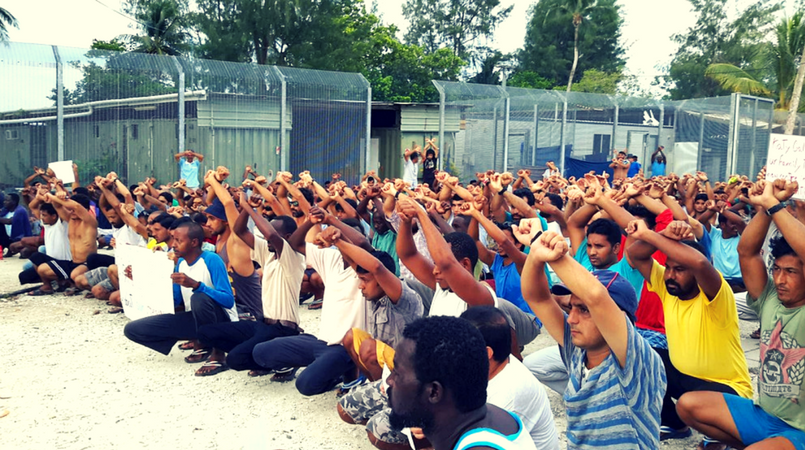Hours after President Trump equated immigrants with a “vicious snake” at last week’s conservative CPAC Forum, he stood side by side with Australian Prime Minister Malcom Turnbull at a joint press conference touting America’s enduring commitment to partnership with our sister nation. Turnbull trumpeted our two nations’ shared values of “freedom” and “the rule of law.”
What wasn’t trumpeted was another distinction our two nations share — recent UN censures for inhumane immigration and refugee policies and practices.
Australia’s draconian refugee policy was formed in the wake of 9/11 and has born its fruit — the internationally unlawful and indefinite incarceration of mostly brown-skinned men, women, and children, most of whom have been deemed legal refugees by the international community. If we’re not careful, Trump will follow Turnbull (and lead the U.S.) off a similar moral cliff.
The 1951 United Nations Convention on the Status of Refugees and its 1967 Protocols provide a legal framework for people to find safety in times of crisis around the world. 145 nations, including Australia and the U.S., ratified the convention and agreed to protect the rights of all refugees.
One of the unintended consequences of the 2001 U.S. invasion of Afghanistan with allied forces was a flow of refugees that became a life-altering reality for nations in the region and triggered Machiavellian political warfare that reverberates to this day.
On August 24, 2001, The Tampa carried 433 asylum seekers from Afghanistan into Australian waters. It was an election year. Then Australian Prime Minister John Howard leveraged the incident for votes and turned the boat away, all too reminiscent of the St. Louis, the infamous ship filled with 937 Jews fleeing Nazi Germany in 1939. The U.S. turned it away, it returned to Europe, and half the passengers perished in the Holocaust.
Australia’s 2001 Tampa Affair led to Prime Minister Howard’s “Pacific Solution.” Howard drew an artificial ring around Australia and declared that anyone who entered these waters by boat would be processed offshore. (It’s important to note that offshore processing did not apply to those arriving by air, which is how the bulk of undocumented people from white majority nations arrive and become undocumented by overstaying their visas.) Australia removed surrounding islands from the Howard migration zone, particularly Manus Island and the tiny island nation of Nauru, to be able to warehouse refugees and asylum-seekers there with no obligation to accept them as refugees.
The Pacific Solution went through fits and starts, but was resurrected in 2013 when, according to Amnesty International, “for the first time since World War II, the number of those forcibly displaced from their homes exceeded 50 million [globally].”
Since 2013, 3,172 images of God have sought safety in Australia, according to the UNHCR Refugee Agency. Among them is Kurdish Iranian journalist and filmmaker, Behrouz Boochani, one of the displaced souls who made that journey and has been interned on Manus Island for nearly 5 years.
Boochani told me his story during a recent interview via secure text.
READ: An Altar Call to Support the Captives on Manus
In Iran, Boochani had leveraged the press to protect Kurdish culture. Government forces attacked his office and arrested colleagues. Boochani fled Iran after reporting on the attack. His journey took him to Indonesia where he boarded a small and crowded boat with 65 other refugees bound for Australia.
“The journey was so dangerous,” Boochani told me. “People were extremely scared, especially the women and children who were with us.”
Hungry and afloat on the sweltering Indian Ocean, desperate families fought the ocean for a week. Then Boochani’s boat broke apart on the waves. It (and he) sunk with the 65 other souls onboard.
They were rescued and brought to Indonesia, where Boochani and the survivors were arrested and jailed in a small town near the capital city of Jakarta. Two weeks later, he escaped and tried to reach freedom again. This time his boat got lost and a British ship hauled him from the waters and delivered him to the Australian Navy, which immediately processed him into its off-shoring refugee system. They interned Boochani on Manus Island on August 28, 2013. More than 1000 men, women, and children remain interned on Manus Island and in Nauru. Many have languished for nearly five years with no actual process for resettlement established.
Similar to President Trump’s claims that a gigantic wall will serve as a deterrent to border crossers, one Australian Prime Minister after another has justified the off-shoring policy by claiming that fewer people will die in refugee boats in Australian water, if they were dissuaded from making the trek in the first place. But the offshore “processing” facilities hold horrors of their own. In November 2017 the UN Human Rights Committee cited physical and sexual abuse, gross neglect, and inadequate medical and mental health care to treat trauma experienced by refugees as they called on Australia to end its offshore processing program.
READ: #LoveMakesAWay: Aerial Sit-In for Asylum Refugees
Only 85 refugees have been processed of the 1250 that the U.S. agreed to receive from Australian offshore detention. Boochani remains on Manus where he has chronicled the movement through journalism, film-making, and organizing.
One can’t help but also think ahead to March 5, 2018 — the artificial deadline set last fall by President Trump to purge from the U.S. an estimated 800,000 DACA recipients and an estimated million more who never registered but are DACA eligible, if Congress does not pass a Dream Act. As the death of DACA approaches, Trump needs to release them from the islands of fear and isolation upon which he has imprisoned them. Brought to the U.S. by their parents as children, these mothers, sons, pastors, engineers, and business owners should be granted a path to citizenship, not deportation.
Unlike Turnbull, Trump still has time to do the right thing and not follow Australia over a moral cliff.

